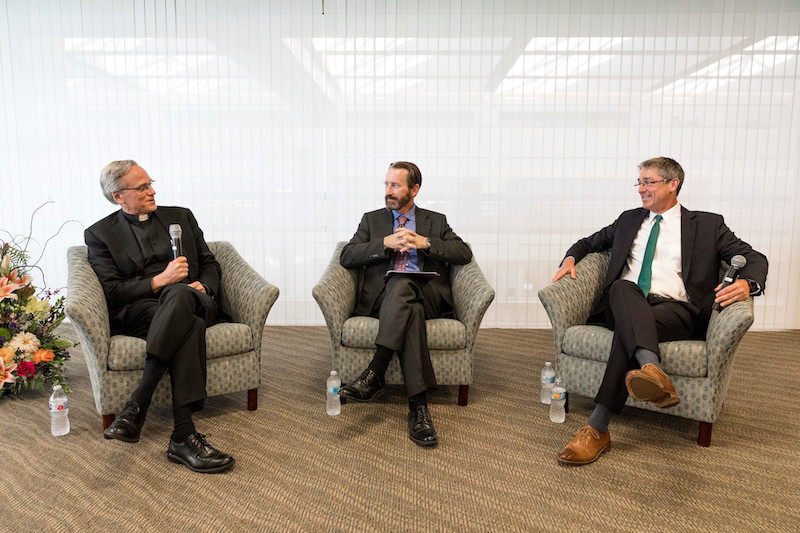
On Oct. 24, 2017, Rev. John I. Jenkins, C.S.C., president of the University of Notre Dame, offered a valuable perspective on the idea and role of the Catholic university in the 21st century. He participated in a lively moderated discussion with Loyola Marymount University President Timothy Law Snyder, Ph.D., and delivered a formal lecture as part of the annual Bellarmine Forum, a program housed in the Bellarmine College of Liberal Arts that invites the LMU community to examine an important theme each year through courses and events designed to ignite an interest in the liberal arts and cultivate an appreciation for their enduring value.
This year, the Bellarmine Forum partnered with the Academy of Catholic Thought and Imagination to consider “The Idea of the Catholic University in the 21st Century,” a theme that resonates with ongoing conversations at and among 28 Jesuit Institutions in the U.S. and with the 50th anniversary of the famous “Land O’ Lakes” statement on Catholic universities.
In their conversation, Father Jenkins and President Snyder speculated that renewed interest in this topic could be tied to a millennial and cultural shift towards secularism. Additionally, millennials are challenging the status quo and traditional power structures in new ways. As a result, societal tensions are rising; but both Father Jenkins and President Snyder see the Catholic university as having an even greater and more important role in these conversations.
Emphasis throughout the two-part event was placed on the importance of an inclusive university community grounded in mission and driven by Catholic values, as well as the Catholic Intellectual Tradition. In her introductions for the event, Robbin D. Crabtree, dean of the Bellarmine College of Liberal Arts, drew from John Haughey’s book, “Where is Knowing Going?,” to remind us that, “the Catholic Intellectual Tradition does not belong to the Church or even to Catholics, but to all those who commit to and work for its principles.” She also pointed out that there is a collective and individual responsibility for embracing our own identities and living out the university’s mission. “We do so as who we are: as Catholics and non-Catholics, as believers and doubters, as social scientists and natural scientists, as humanists and artists and entrepreneurs and filmmakers and educators and engineers and activists, as folks who come from all sorts of life circumstances and who are heading into all walks of life.”
Brian Treanor, professor of philosophy and director of the Academy for Catholic Thought and Imagination, moderated the panel discussion. He echoed Dean Crabtree’s message, “It is entirely possible to have a shared, detailed educational vision while maintaining a faculty and student body that is diverse in terms of its religiosity, its politics, and its various cultural influences.”
Father Jenkins and President Snyder also promoted freedom as a characteristic of the Catholic university’s identity, as well as an environment in which students, faculty, and staff are able to explore and build a spiritual life. The intersection of intellect and virtue allows the institution to speak more powerfully than its secular counterparts. Both Father Jenkins and President Snyder agree that with this power comes the responsibility to use our voices to confront injustices and bring people together.
Intellectually engaging faith, building a diverse community, and cultivating women and men who stand with others are areas where the Catholic university can stand out in the 21st century. The ultimate goal in doing so is to be a beacon of hope in a sea of uncertainty; to learn but also to do; to act out our mission with love; and to meaningfully contribute to a more just and humane society.



